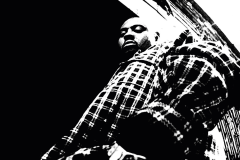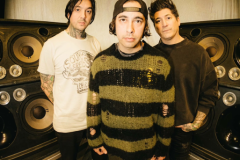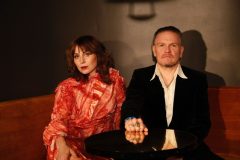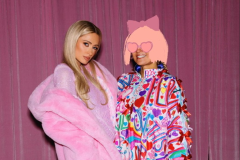When avant-rap juggernaut BEANS appears to go missing, people get ready. Don’t let his recent five-year ‘absence’ fool you; dude was on the j-o-b. During that time, he was parlaying his prolificness into three full-length albums and his first novel, Die Tonight, a relatively existential examination of an avid high school-age vinyl collector who becomes possessed by one of his records, all four of which were released in March 2017. All.of.them.
This month sees the release of a five-track, limited edition BEANS cassette EP on French label Hello L.A. Nights Without Smiles presents a departure from his sounds of late, with its inclusion of live instrumentation and a slower poetic flow, but it also gives we listeners a break in the action, via two strategically-placed instrumentals, to ingest and digest his oral output.
Ghettoblaster recently had the opportunity to chat with BEANS about the book, the new releases, future plans, and how now living in the Midwest impacts his work.
Describe 10-year-old BEANS.
Well, at 10 years old, my father had just died. After that, I had a little trouble going to sleep because I thought the same thing that happened to him was about to happen to me if I closed my eyes. So at 10 years old, I was still trying to process death because I didn’t fully understand it because of the way it happened. It happened on December 14th, and I went to say ‘goodnight’ to my Dad in the next room and instead of saying ‘goodnight’, he opened his eyes and said ‘goodbye’ and gave me a warm hug and a kiss. The next morning, our Mom came into our room to wake us up for school and she was crying. We asked ‘what’s wrong?’ and she told us that my Dad had died. My Dad died in the next room. So I went into the next room and the person who had kissed me goodnight was the same person lying there, lifeless. This was around Xmas time. He died on the 14th, and he was buried on the 18th. And I never dealt with Xmas or the holidays again. It wasn’t the same to me anymore. It didn’t mean as much to me. In December, we were living in Mt. Vernon [New York] at the time, on Lincoln Avenue, and we moved from Mt. Vernon, on the day before my birthday, to Greenburgh in Westchester County. I remember being unpacked in the house, in the living room. The couch wasn’t set up, the house wasn’t set up. Everything was in disarray. I was sleeping on the couch and there was this crazy rain outside. I was about to start a new school and didn’t know anyone in the neighborhood. It was crazy raining, and that was very painful.
I appreciate you sharing that, and, we’ll also get into this a little when we start talking about your first novel, Die Tonight. But I can see how that influenced your words and how you used your words to cope with that over the years. I can imagine even today, it’s still so impactful to you.
Definitely. It’s gotten a little easier, but at least I have an outlet that I create for myself to deal with these things.
You have an extremely extensive vocabulary. If the words in your vocabulary were jelly beans, how many would you guess are in the jar?
Maybe at least 150.
What color or flavor would they be?
Popcorn. I pretty much like every flavor except licorice. I like the popcorn, the bubble gum, the cherry, the vanilla and the blue ones. But no licorice.
Being prolific has never been an issue for you. Where do you think that originated from? Have you always been able to compile a lot of material no matter what you were doing?
A variety of things influenced the writing, and, at the time, I didn’t fully appreciate it. When I was young, I would go to the movies and my father would make me write reports about it. And [the prolificness] didn’t really come about until my late teens, when it became an outlet for me to deal with various growing pains. But, to be honest with you, the reason these three albums came out is kind of weird because I had the first record done, but I was already working on [the second record] Love Me Tonight. By the time I had started doing Love Me Tonight,I had always wanted to write a book. So I started writing a book at the same time. As soon as I started writing the book [Die Tonight] and finished Love Me Tonight, I moved to Cleveland and had this idea to do [the third album] HAAST. Maybe a year or two before I actually did it, I knew I wanted to do a record that incorporated more live instrumentation. I met the producer from Wolves of the World at an event that we did. I liked his beats and followed him. It took a little minute to finish Wolves of the World. And then I was working on Love Me Tonight, and it took me a while to piece that together so it would coincide with various changes. The book was also something, too, because my mom and I were both going to writers’ groups, and she was writing a book of poetry and I was writing Die Tonight. So it became something we kind of did together. And no one had done it before. No one had done three records and a book simultaneously. It wasn’t really my overall objective to do all of that at the same time. It just sort of organically happened that way.
You have the book, the three albums, and a little less than a year later, you have the cassette EP coming out. So with the book and three albums, that’s like a bundling thing, even though you weren’t selling them all together. In modern music merchandising, the bundle thing is the way to go. It seems like fans today need more than just ‘here’s an album’. So it’s interesting that’s how it turned out because it inadvertently fits into that approach without you even realizing it.
Are you planning on any multidisciplinary works in the future using your words and music, something that combines all of that?
The next sort of thing that I’m starting to work on is a comic book called LULU. I have been doing the research for it for a number of years, what it was about. To be simple about it, it’s about a man and his worm. I don’t want to go into any further details. It does examine what’s happening politically and socially right now, but the main premise of it is about a man and his worm. I had recently decided that I’m going to draw, write it and illustrate it myself. So that’s going to take awhile, but I do plan on doing that, as well as this cassette EP [Nights Without Smiles.] I’m trying to release another EP I’m working on, and I’m trying to start recording for the next record within the next month. So I just keep it moving. Once something is done and I know how it’s coming out and going to be presented, I’m already on to the next thing. That’s kind of how it mapped out. It’s just the way I think creatively. It kind of helps motivate me to continue to do and finish the next thing. The hardest part for me is the writing. That takes the longest for me. Everything begins with the titles (of the songs).
When you’re talking about song titles, I noticed with Wolves of the World that the song titles, each of them is like a line in a verse type thing, and, I don’t know if you meant to do this, but when you read them all together, in one run, they sound like one of your verses.
That’s completely unintentional. Wow, that’s crazy.I had never thought about that, but it’s completely unintentional.
<I proceeded to read/rap the following song titles in order:>
1. The Echo of Events Unknown And It Held Meaning / 2. Incinerated Composed / 3. Diamond Wizard / 4. She Walked Towards The White Like Movie Star Teeth / 5. Grey Meat / 6. I Loathe You for Sentimental Reasons / 7. Rainbows Get Sick and Die / 8. I Don’t Know Magic Tricks to Get Your Attention So All I Can Do Is Be Sincere / 9. Existence Becomes One Long Day / 10. Windswept, The Contents Of The Heart Grow Bleak / 11. New Brain Death Blast / 12. There’s Nothing I Want More Than to Walk Towards The Sweet Release Of Death With You
I would have never thought that, but, yeah, it does. As a matter of fact, why don’t you just write ‘yes.’ (BEANS and I laugh.)
Those song titles are (totally) a poem to me.
Ah, cool. That works. I’m running with that.
You had a little bit of a break, for five years or so.
To do the three albums and the book, it took five years. I was working the whole time.
Even though you were working, to your outside fans you were taking a break.
I can see it being perceived that way, but I was working the whole time. The book took two and a half years to get done.
This is such an output-driven society now. You have to constantly have material out there, and releasing every other day. Was it hard to not be ‘out there’ as much, as you had been in previous years, or were you just so focused?
I couldn’t figure out a way to do both without sacrificing one for the other. I had to come back correct, and, in order to do that, I had to allow myself that time to do so. The climate has changed, a five-year gap, a lot has happened in five years. It’s not the same. Taste in music has changed, and people who they look at has changed. I still feel like I reacclimated myself in the way of doing things to how people are used to now. Having not had that time of being as visible. I still feel that I’m playing catch up. So when I say I have an EP and the next album I’m about to record next month, and that I’m trying to have another EP out in August, I kind of like that pace because it will allow me to maintain and do what I’m doing but on my own terms.
How long have you lived in Cleveland now?
Around three years.
Has that had an influence on your writing or perspective?
It’s cheaper. <Laughs>. You can actually afford to live here. I’m still getting used to it. In my heart of hearts, I’m very much a New Yorker, but I’m still getting used to it and getting acclimated. I’ve settled down a lot. Being out here has allowed me to focus more on writing and keeping up the pace that I’m setting for myself in terms of releasing and putting out stuff.
Maybe fewer distractions?
Definitely fewer distractions.
You were in Antipop Consortium for a long time, but have also been a solo artist for a long time, while collaborating with a few folks here and there, like Elucid. What do you find most beneficial about being a solo artist, and also, conversely, what is most disadvantageous?
I like doing things on my own terms. I have to be honest, full disclosure, I’m not always the best person to collaborate with. I’m pretty stubborn. I’m very firm in my opinions. With that said, I do like working with various people because you get various sounds and I find that collaborating with, specifically, other musicians and producers, it allows me to open up and experiment in new ways. Specifically, this new EP with the instrumentation, versus an album I did as a solo individual in HAAST (primarily with producer Ay Fast). And this EP sounds nothing likeHAAST, as the next release will sound nothing like Nights Without Smiles. I like to keep it moving and work with various people just to keep that challenge up. Being in a group doesn’t always make me the best collaborator.
So the one-offs collaborations, are they a little easier because it’s not entirely a commitment where there is more expectation of a compromise?
One-offs are interesting to me because one of the most straight-ahead producers I’ve worked with was Mux Mool, when I did Knifefight (Anticon, 2013). He had a different sound, and that allowed me to write in a different direction. Then Nights Without Smiles was another direction. And those little collaborations, I like to work with people outside of specific ‘Hip Hop’ producers just for the challenge of seeing where I can go artistically and where I can take this without losing anything of myself and trying to retain what I can bring to the table. Artistically, I like the challenge and that’s why I like those one-offs, working with one producer here and one producer there, the change of the sound.
I personally don’t listen to the same type of music, as a listener. I don’t like to listen to the same genre all the time. So I don’t like to necessarily hear the same genre for myself.
Is that the approach you’ve always had, or has that intensified for you more as of late?
That approach really came around in the ‘90s. This was the height of (Naughty by Nature’s) ‘Hip Hop Hooray’. The ‘90s had some jams. Looking back, it was a great era for Hip-Hop. But at the time, I got bored. I stopped listening to Hip-Hop for like three years. I just listened to jazz and that’s how I really got into jazz. I put it (Hip-Hop) aside, and I stopped listening to it. Choruses were the same, rhymes were the same. It just got boring. I needed something else. That attitude has intensified. As a listener, and as one who appreciates music, it has intensified as I’ve been able to discover new things. I wanted to hear how can rap approach this particular type of music and how I could expound on this. Where can I take this? What can I do with this? How can I rhyme on that? How can I write to this? What can I say on this? What’s going to work with this? It challenges potential.
It keeps it interesting to me because, as I said, my listening choices change constantly. I listen to one album in one genre, and, in the span of a couple hours, I listen to an album of another genre. I don’t like to hear the same type of music all the time. I always try to discover new things. And I like to keep that approach for myself, as well.
Let’s get back to your three (3) releases of last year on 3/31/2017. You released Love Me Tonight, which, of course, was about love. I love how the description was ‘Love in all its manifestations, both rewarding and costly.’ And then HAAST. The songs are hard, but in a different way than we’ve heard on your releases in the past. That different type of sound we were discussing earlier.
And HAAST is an extinct species of eagle?
Yes, that’s true.
Thematically, HAAST is about the violence and assaults against Black folks in America, whether that’s police brutality and murder, or economic violence, and everything in between. One of my first questions on HAAST would be how does the name of that album connect with its subject matter?
That’s an interesting question. I guess the title goes to the fact that, at the apex of murder at the hands of police, it’s about Black men facing extinction versus a bird that is extinct. Subconsciously, I was making that correlation.
HAAST is important in that everyone of color in this country is on the potential path to relative extinction.
Moving on to the cassette EP being released this month, Nights Without Smiles, how did that partnership with (French label) Hello L.A. come about for them to put that EP out?
When I finished Nights Without Smiles, I sat on the tracks for a minute because I was trying to finish up those three records. I had just figured out when those three records were coming out, and my Mrs. and I had met with Michael (Beharie, producer) and Diamond Terrifier (sax player onNights Without Smiles). I saw Diamond Terrifier online, got in touch with him and was like ‘Yo, let’s do an EP.’ We went out to New York, went to his house and discussed it, and it took them a few months to get the tracks together. Then they sent it to me, and I was trying to figure out how the three albums were going to come out, so I put it on the backburner a little bit. After I recorded Nights Without Smiles, reshaped it, Michael mixed it. I was happy with it. Then I thought ‘yo, this would be an ill cassette’. I think I was on Facebook or something, and I saw Bertrand from Hello L.A., so I just hit him up. I was like ‘Yo, I got this thing. Would you be down to put it out?’ After he heard it, he was like ‘Yeah, let’s do this.’
That label was the perfect fit, and I love the photo for the cassette. Because you do have that enigmatic vibe about you, and that photo expresses that. But the sound on this EP is jazzier. It’s interesting because it’s such an impactful photo, while being minimalistic, and a listener might be like ‘I don’t know what the fuck this is going to sound like.’ Some people might be expecting some heavy metal beats, some people might be expecting avant-garde stuff, or something entirely different. It’s this laid-back avant-jazz with some sax riffs, and more of what you did in your earlier days, more poetry over music, that keeps us engaged because it’s something different than what we’ve heard for you as of late. I mean, going from HAAST to Nights Without Smiles, that’s a big chasm there.
Yeah, exactly. It’s a big shift. The next release just keeps that trend up.
The first four songs (out of five total) on Nights Without Smiles are more jazzy and laid-back and more poetic, in the traditional sense, rather than straight rapping. But then the fifth song, ‘Castles’, is different from the rest so that even WITHIN a release, you will switch it up. And the second and fourth songs are instrumentals like you were giving us time to take a break and process what you were saying. Because in the first song, ‘Sax Mallets’, you’re talking about ‘Rippin’ rhetoric to raw rah-rah. Rap is dead’, and then you go into a nice avant-smooth jazz jam, and then on the next song, ‘Earths’, you’re talking about ‘the Charley Horse crampin’ your style’, and then we get another break.
What was the intent or the meaning behind having on an EP, where you’re a person known for your rhymes and words, two of the five songs be instrumentals?
Originally, it was just the three tracks, and it was Michael’s and my idea to add the instrumentals because I thought that it needed something to create a flow between the vocal tracks, and I thought the instrumentals would work nicely and give the listener a break from verbiage all the time. Just as an album construction that the instrumentals would work. Once you heard the vocal tracks it would emphasize those more because, as you had earlier stated, that it does give you that chance to catch up. That was the main reason behind it, especially on a shorter record. I think for me that it’s easier now and that it’s something I want to investigate further, just doing EPs. It will be lesser songs, but it could be longer songs. It would allow me to put out more stuff faster, and it would allow me to stretch out more creatively with EPs. Taking a more jazz approach to it,
The line I stated earlier from ‘Sax Mallets’, ‘Ripping rhetoric to raw rah-rah. Rap is dead.’ Do you think rap is dead?
No. It is sort of varied. You can have Armand Hammer, and still, have Joey Bada$$ and Migos. There’s room for that now. I like how everyone now has a much more distinct sound. I like that now. So no, I feel it’s not (dead)…not if I have anything to say about it.
Rap is poetry, regardless of how people deliver their words. As long as poetry is around, rap will always be around. Do you think that’s a true statement?
I think it will always be around, as it will always take various forms, like trap. I may not be a fan of all its iterations, but I acknowledge that it exists.
Let’s start talking about the book, your first novel, Die Tonight. I’ve finished the first four chapters so far, and those are pretty packed with murderation.
I gotta be honest with you, it gets better in the end. Even my Mrs. has stated that, in the beginning, it leads you toward that maybe there’s a specific way it’s going to go, but there are a lot of surprises. I spend more time in heaven as well, and then the end of the book is completely unexpected.
I like that you mentioned ‘heaven’ because your boy Kevin was doing his thing in purgatory or heaven or hell, I’m still trying to figure that out. [Main character] Eric is this shy kid who envelops himself in his record collection, gets bullied in typical high-school situations, and becomes possessed by an eponymous record from an artist named Stalker, a person who’s ‘life was paralleled only by G.G. Allin’s.’ Eric got tired of the bullying, and, I haven’t finished the book yet, but, in building Eric’s character, was that something that you could identify with as a younger person and/or….
[Interrupts]. Yo, I AM Eric.
Oh, you ARE Eric?
I AM Eric. [Laughs]. Yeah, I AM Eric. Beware, man. [more laughs].
I perused through the rest of the book, and I noticed that, right before Chapter 22, there’s just a page that’s very separate from everything else. It begins ‘On January 27, 2014, Robert Edward Stewart, III was born.’ And then you have the piece right after it.
I can’t tell you [what that means] until after you’re finished.
When you said ‘heaven’ in the book during the first four chapters, it reminded me of [French existentialist Jean-Paul] Sartre’s play No Exit, in, that hell is other people. While some of the characters find themselves stuck together in a certain place, even Eric, who is among the living, seems to struggle with other people representing hell to him. More than having a vengeful spirit, it seemed like Eric was just not feeling other people.
Yeah, exactly.
Was that where that was going?
You could say that. You wouldn’t be completely wrong.
Looking at the title of the book, Die Tonight, if you would die tonight, what would you want put on your tombstone tomorrow?
‘He did the damn thing.’
Nights Without Smiles by Beans
Purchase the limited edition Nights Without Smiles cassette EP w/ digital download
Pre-order Wolves of the World on vinyl
Photo by Lauren Hilary Clune.
Facebook | Bandcamp | Label Cassette EP | Twitter | Instagram









Social Media